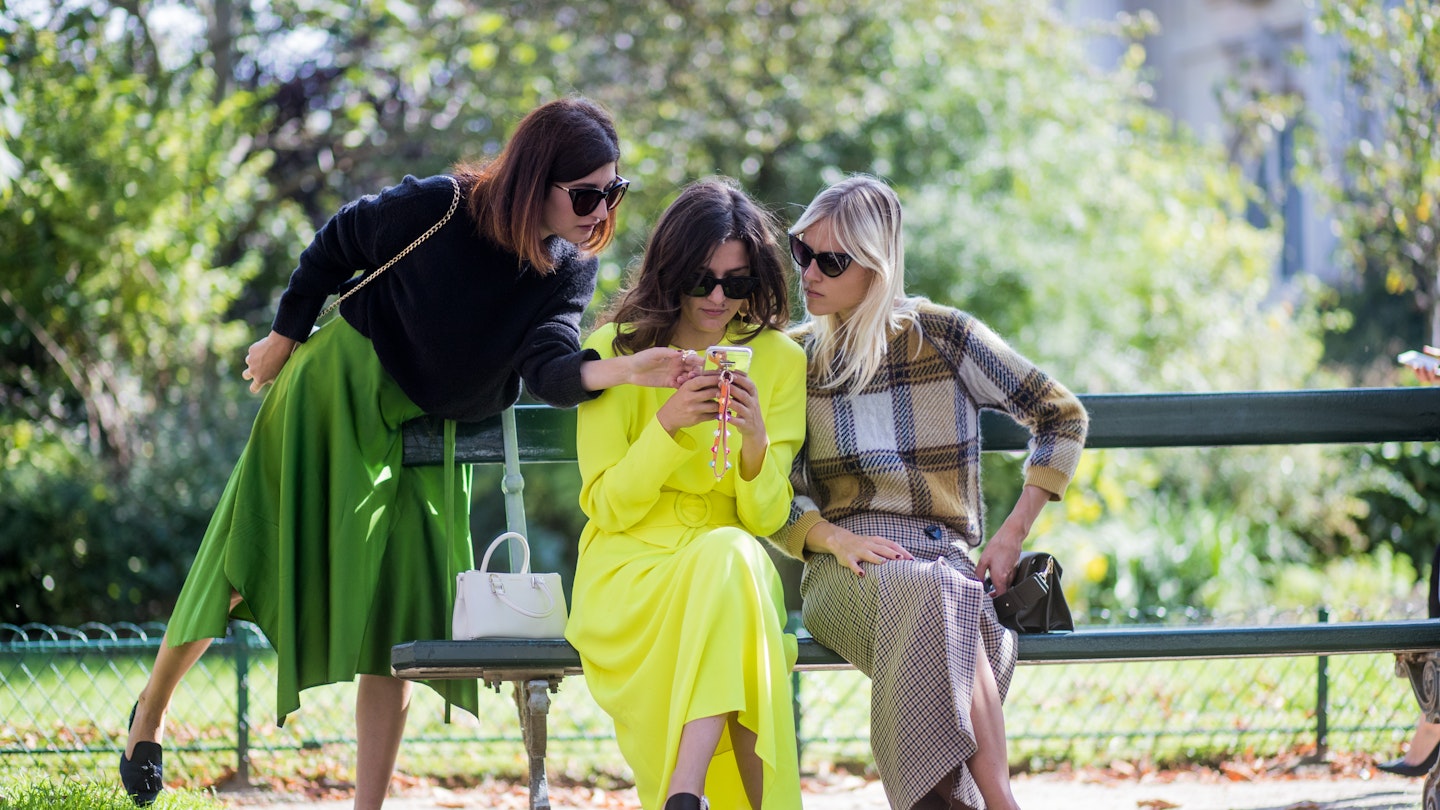There’s this dress I’ve been obsessed with on Instagram for approximately 14 months now. I look at the brand’s page almost every day; I follow the founder and some of its ‘dream girl’ models; I instinctively recognise if someone I follow is wearing one of their pieces. If it was a person, I’d be verging on restraining order territory. I already know that this dress is something I’ll buy with my birthday money this year, despite having never tried it on, never touching the fabric, never judging the fit. And I know instinctively that it will make me extremely happy. When I think about this, I think I might be a bit mad. Until I realise that other people are doing the same thing every day – because Instagram is commodifying our happiness.
Take my friend Alyss Bowen, social media editor at Byrdie. She buys stuff that she’s seen on Instagram all the time – in fact, she says she browses her favourite Insta-pages for shopping inspiration more than she would an actual online retailer.
‘As a social media editor the majority of both my work and personal time is spent on Instagram so chances are—if there's a new dress or jacket doing the rounds, I've seen it and I want it,’ she explains. ‘There's something really special about lusting after a product I've seen on an actual person on Instagram, rather than on a model on a website, that makes me want it more. My favourite jeans were an Instagram purchase. I debated it for a while until I'd seen 4 different people wear them and look amazing—now they make me happier than any other item in my wardrobe.’
The dress in question...
And it makes sense that we feel this way. After all, the majority of people that we follow on Instagram - the 50% that aren't meme-publishers, that is - are those whose lives are aspirational to us in some way. We want to see their pictures because their lifestyle inspires us to improve ourselves and our lives, therefore making us feel happier. Seeing an influencer’s latest cult purchase, which isn’t available on the high street, and not owned by all of friends already, makes us feel as if we’re in on a cool secret. Owning it ourselves would induct us into that same world.
As Dr Carolyn Mair, Professor of Psychology for Fashion, explains, ‘One of the drivers for us in everyday life is self-enhancement. We want to feel good about ourselves by other people’s standards of us. When we compare ourselves to someone on Instagram, we’re thinking, “Wow, we could be like this person if we had that dress,” and brands are very clever in using influencers and celebrities to mean something to their target population.’
It’s also the same way that all good branding works: if the brand and the product are coherent, then we want to buy into an entire lifestyle, rather than just one specific item. As Mair says, ‘When we see people on Instagram in certain surroundings, being glamorous, it’s a lifestyle thing that consumers feel they can buy into by buying the product. You buy the lifestyle when you buy something from that brand.’
It’s how so many designers have found success through marketing their brand exclusively on Instagram through influencers - including Realisation Par, Reformation and Rouje. Rixo London has strong stats to back up this: a recent picture of Ashley Graham wearing its velvet Iris dress saw a 40 per cent increase in sales in just 24 hours.
As Thalia Renucci, PR for Rixo London explains: ''The effect of Instagram on sales has become a significant factor in our sales analysis. With Ashley Graham for example, the Iris became our top performing product that week and we also saw an increase in international orders too (particularly the USA). This clearly shows that the Instagram post and the origin of where the influencer is from/has the largest following, reaches and translates to customers on a global scale. This also rings true when any influencer tags us in a post - it will inject a boost of sales in that style as it shows customers a relatable way to wear a Rixo piece they may have otherwise overlooked.'
But is it the case that once we’ve bought that killer purchase that we’ll be as ecstatically happy as we imagine? Possibly not, according to Mair. ‘We are driven to this one thing, which is novelty,’ she explains. ‘We get pleasure from the chasing, not so much the buying. When we’re looking at Instagram, we’re getting a lot of pleasure from looking at these things and thinking ‘I want to have it’. And once we’ve bought it the dopamine levels drop – we’re not satiated for very long.’
So, knowing what I know now, (essentially that our appetite to buying clothes is akin to pursuing romantic partners...) will I still buy said life-changing, happy-making dress? Knowing that once I have it I'll only want something else? Dear reader, it’s already on its way to me... but the next big Instagram obsession is also already bookmarked.
